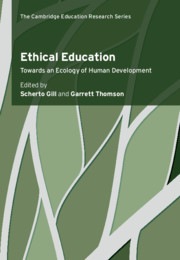Book contents
- Ethical Education
- Ethical Education
- Copyright page
- Contents
- Contributors
- General Introduction
- Part I Theoretical Perspectives on Ethical Education
- Part II Pedagogical Approaches to Ethical Education
- Introduction to Part II
- 4 Changing Cultures
- 5 Ethical, Existential and Spiritual Re-Orientation
- 6 Confirming Moral Agency
- Conclusion to Part II
- Part III Ethical Education in Practices
- Notes
- Bibliography
- Index
5 - Ethical, Existential and Spiritual Re-Orientation
from Part II - Pedagogical Approaches to Ethical Education
Published online by Cambridge University Press: 30 June 2020
- Ethical Education
- Ethical Education
- Copyright page
- Contents
- Contributors
- General Introduction
- Part I Theoretical Perspectives on Ethical Education
- Part II Pedagogical Approaches to Ethical Education
- Introduction to Part II
- 4 Changing Cultures
- 5 Ethical, Existential and Spiritual Re-Orientation
- 6 Confirming Moral Agency
- Conclusion to Part II
- Part III Ethical Education in Practices
- Notes
- Bibliography
- Index
Summary
Chapter 5 explores the question: ‘Which experiences and reflections could help young people to become more ethically aware and motivated within the context of public education?’ It addresses four important societal worries. First, the rise of relativism as different worldview positions meet and confront each other in a super-diverse society. Second, the existence of populist hermeneutical bubbles, in which people only get information that confirms their own views. Third, a general attitude of apathy and uncaring in an economy-driven society that only believes in market values. Fourth, a hardening of traditional moral positions of minorities who feel threatened in their group identity. It argues that the ethical should be understood in a broad sense, and that the crisis is not only about norms and values in a strict moral sense of what is right or wrong behaviour; it is also about an existential search for identity and belonging, and about sources of inspiration for living a ‘good life’ that transcends the particular needs of a person. It thus proposes ethical, existential and spiritual re-orientation which encompasses personal and societal explorations and evaluations with regard to diverging views on the ‘good life’ as found in late-modern societies.
Keywords
- Type
- Chapter
- Information
- Ethical EducationTowards an Ecology of Human Development, pp. 79 - 92Publisher: Cambridge University PressPrint publication year: 2020

